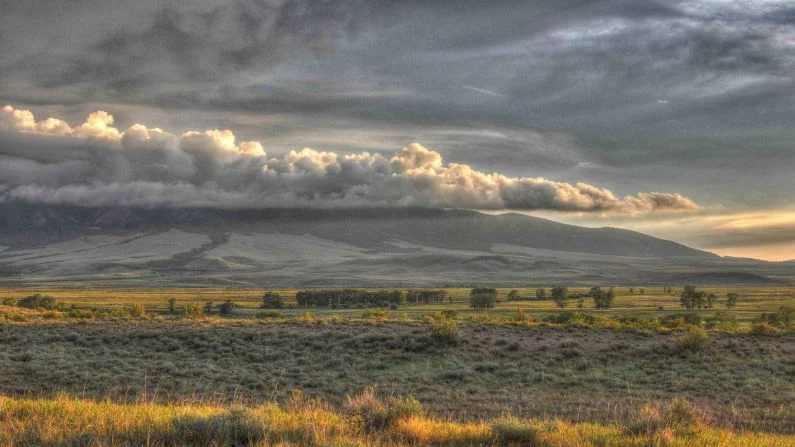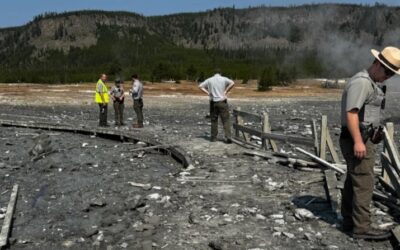A battle between private landowners and hunters in Wyoming is headed to federal court. The disagreement over land access in the southern portion of the state is just the latest in a parade of conflicts in the West over what constitutes public land and who should have access to it.
The owner of the 22,045-acre Elk Mountain Ranch is suing four hunters for $7.75 million in damages. In order to access public land, the men used a ladder to climb over a fence and pass through the airspace in a corner of the ranch’s private property in 2020 and 2021, according to the case in Wyoming’s U.S. District Court.
Ben Ryder Howe covered this story for The New York Times. He took us to the heart of the battle around Elk Mountain.
This conversation has been edited for clarity and brevity. It was recorded on Dec. 5.
Ben Ryder Howe: Elk Mountain really sticks out in southern Wyoming, and a lot of people I talked to said that they had been obsessed with it their whole lives. The mountain is mostly owned by one person who bought it about 20 years ago, and it’s known for having great hunting. So, this obsession has led some people to look for ways to access some of the hunting there on the public land, because parts of the mountain are public and are owned by the state of Wyoming. Parts of it are Bureau of Land Management land. For years, there have been a number of hunters who tried to figure out a way to access the public land that is trapped inside of the private land on Elk Mountain, and that’s how this case came about.
Hanna Merzbach/KHOL: You get into this phenomenon of corner crossing. Would you tell us what that is and how that played into this case?
Ryder Howe: If you picture the checkerboard of property ownership on the landscape throughout the West, it goes public, private, public, private for the most part. This creates this pattern where you have public and private land meeting in a corner, just like on a checkerboard, and some hunters believe that it is a legal way of accessing public land, to hop over [the corner] from one public square to another. The rules vary by state. At least in Wyoming, it is a gray area. It has not been well-defined until now, and there have been previous cases attempting to figure out whether an everyday citizen is able to do that, hop from the public to the public.
The people who are against corner crossings say this involves violating the airspace of the landowner or landowners who own the adjacent piece of private land. So, this has been a controversy for a long time, and it has resulted in this case going now to federal court. There are some who think that it may ultimately set a precedent for not just Wyoming, but other states where you have that checkerboard pattern of land ownership.
KHOL: Like you said, this has been a controversy for a long time, but your article talks about a new technology which added to this controversy. Can you tell us more about how this technology aided in this conflict?
Ryder Howe: There are a number of apps that are used by hunters and other outdoor recreators to figure out where they are on the landscape. They’re very similar to Google Maps. The pioneer for these apps is called OnX, and it’s used, as far as I can tell, by almost every hunter, either OnX or one of its competitors. This app gives you the ability to see where you are on the landscape in relation to private and public land, which is valuable for a hunter because a hunter doesn’t want to trespass. The hunter may be pursuing game that is going back and forth from public to private land, and the hunter may not have permission to go on the private land. Hunters may have guns that would complicate a situation if they were on land in which they were unwelcome.
So, these apps have given them the confidence to go places where in the past it would have required more work than most hunters were willing to put in to figure out the local patterns of land ownership. This is encouraging them to go places where they maybe are making the local landowners uncomfortable or where landowners aren’t used to seeing people before. It’s also made it much easier for the hunters to corner cross, because they can usually find a way to be pretty precise. That is what has been triggering some of the conflict that led to this situation on Elk Mountain.
KHOL: I know you live in New York City, but you frequently cover the American West. What drove you to report this story?
Ryder Howe: This story to me fits into an overall pattern of changes occurring in the West, where you have land that is falling out of the ownership of families and family farms or ranches and is often being bought by individuals who are newcomers to the area or who might be corporations that are setting up hospitality operations. This is creating some degree of social tension across the West. It’s also creating economic opportunity and has become, as one of the people I talked to for this article said, the “economic lifeblood of the area.” The story was a lens on the much larger social change occurring around the West.
KHOL: What should we watch out for moving forward?
Ryder Howe: My understanding is that this case is going to take several more months to resolve as it moves through federal court. I think the thing to watch for really is to see what kind of public reaction there is. Wyoming has an immense amount of public land compared to other states, and one thing that I realized very quickly is how passionate residents are about it.
The big takeaway for me in reporting this story was how deeply the conflict is felt by people, regardless of their politics. People who feel very, very strongly about public land and people who feel very, very strongly about hunting and about private property can feel very divided about this case. It’s almost like they’re really not sure where they stand on it, because it is an unsolvable conflict for them, which is one of the reasons I was attracted to the story, because it shows that there’s a real tension here over something with real relevance to everyday citizens.





